
Kansas is an American rock band formed in Topeka, Kansas in 1973. They became popular during the decade initially on album-oriented rock charts and later with hit singles such as "Carry On Wayward Son" and "Dust in the Wind". The band has produced nine gold albums, three multi-platinum albums, one other platinum studio album (Monolith), one platinum live double album, and a million-selling single, "Dust in the Wind". Kansas appeared on the US Billboard charts for over 200 weeks throughout the 1970s and 1980s and played to sold-out arenas and stadiums throughout North America, Europe and Japan. "Carry On Wayward Son" was the second-most-played track on US classic rock radio in 1995 and No. 1 in 1997.

John Elefante is an American singer, songwriter, musician, and record producer. From 1981-1984, he was lead vocalist of the rock group Kansas and is currently touring with several groups that have featured members from classic rock bands. His credits include writing and singing lead vocals on three multi-platinum albums. He produced albums that have earned numerous GMA Dove Awards, four Grammy Awards, and ten Grammy nominations. He has maintained a close working relationship with his brother, Dino, co-writer of several Kansas songs.

"Margaritaville" is a 1977 song by American singer-songwriter Jimmy Buffett, released on his seventh album, Changes in Latitudes, Changes in Attitudes. In the United States, "Margaritaville" reached number eight on the Billboard Hot 100 chart, and went to number one on the Easy Listening chart, also peaking at No. 13 on the Hot Country Songs chart. Billboard ranked it number 14 on its 1977 Pop Singles year-end chart. It was Buffett's highest charting solo single. After Buffett’s death on September 1, 2023, the song re-entered the Top 40 for the week ending September 16, 2023.

Vinyl Confessions is the eighth studio album by American rock band Kansas, released in 1982. It includes "Play the Game Tonight", which broke the Top 20 and is Kansas's third highest-charting single, surpassed only by "Carry on Wayward Son" and "Dust in the Wind". The album was reissued in remastered format on CD in 1996 on Legacy/Epic and again in 2011.
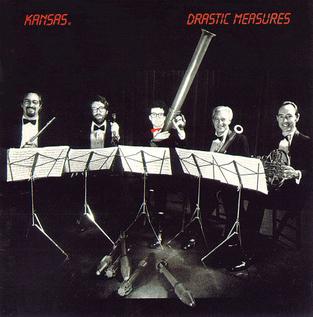
Drastic Measures is the ninth studio album by American rock band Kansas, released in 1983.

"Man on the Moon" is a song by American alternative rock band R.E.M., released in November 1992 as the second single from their eighth album, Automatic for the People (1992). The lyrics were written by lead singer Michael Stipe, and the music by drummer Bill Berry and guitarist Peter Buck. The song was well received by critics and reached number 30 on the US Billboard Hot 100, number 17 on the US Cash Box Top 100, number 18 on the UK Singles Chart, and number one in Iceland. It remains one of R.E.M.'s most popular songs and was included on the compilations In Time: The Best of R.E.M. 1988–2003 and Part Lies, Part Heart, Part Truth, Part Garbage 1982–2011.

"The Name of the Game" is a 1977 song by Swedish pop group ABBA, released as the first single from the group's fifth studio album, ABBA: The Album (1977). It became a UK number one, topping the UK Singles Chart for four weeks in November 1977.

"Nightshift" is a 1985 song by the Commodores and the title track from their album of the same name. The song was written by lead singer Walter Orange in collaboration with Dennis Lambert and Franne Golde as a tribute to soul/R&B singers Jackie Wilson and Marvin Gaye, both of whom died in 1984. The song was released as the album's first single in January 1985 by Motown Records. "Nightshift" was recorded in 1984 and became the Commodores' first hit after Lionel Richie's departure from the group. Bruce Springsteen covered the song in his 2022 studio album, Only the Strong Survive.
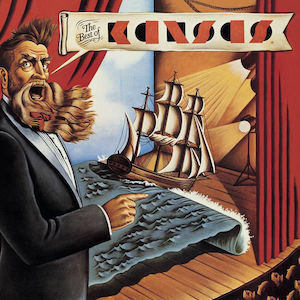
The Best of Kansas is the first compilation by American progressive rock band Kansas. Originally released in 1984, it featured the new "Perfect Lover," written by then-lead vocalist John Elefante and his brother Dino Elefante.

"Dust in the Wind" is a song recorded by American progressive rock band Kansas and written by band member Kerry Livgren, first released on their 1977 album Point of Know Return.

"Heartache Tonight" is a song written by Don Henley, Glenn Frey, Bob Seger and JD Souther, recorded by the Eagles and features Glenn Frey on lead vocals. The track was included on their album The Long Run and released as a single in 1979. It reached No. 1 on the U.S. Billboard Hot 100 in November of that year and was certified Platinum by the Recording Industry Association of America representing one million copies sold. It was the Eagles' final chart-topping song on the Hot 100.

"Two Tickets to Paradise" is a song by American rock singer Eddie Money from his 1977 self-titled debut album, Eddie Money. It was released as a single in June 1978 and reached number 22 on the Billboard Hot 100. The song has since become a staple of classic rock radio, and it was Eddie Money's signature song.

"Take Me Home Tonight" is a song by American rock singer Eddie Money. It was released in August 1986 as the lead single from his album Can't Hold Back. The song's chorus interpolates the Ronettes' 1963 hit "Be My Baby", with original vocalist Ronnie Spector providing uncredited vocals and reprising her role. Songwriting credit was given to Mike Leeson, Peter Vale, Ellie Greenwich, Phil Spector and Jeff Barry.

"Family Man" is a pop rock song written by Mike Oldfield, Tim Cross, Rick Fenn, Mike Frye, Morris Pert, and Maggie Reilly. It became a hit song in 1982 for Mike Oldfield with Maggie Reilly as the vocalist. Daryl Hall and John Oates achieved success a year later with their cover version. In 2009, Maggie Reilly recorded another version of the song for her solo studio album Looking Back Moving Forward.
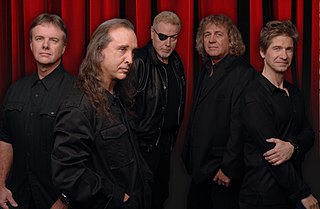
The discography of Kansas, an American rock band, consists of 16 studio albums, seven live albums, nine compilation albums, and 29 singles. Formed by members Kerry Livgren, Robby Steinhardt, Dave Hope, Phil Ehart, Steve Walsh, and Rich Williams, the group signed a recording contract with Kirshner Records in 1974. That same year they released their self-titled debut album.

"I'm Not the One" is a song by the American rock band the Cars, from their fourth album, Shake It Up. It features Ric Ocasek on lead vocals, Benjamin Orr singing the 'you know why' phrase, and the whole group repeating "going round and round" as backing vocals throughout the song.
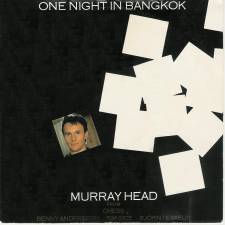
"One Night in Bangkok" is a song from the concept album and subsequent musical Chess by Tim Rice, Benny Andersson, and Björn Ulvaeus. English actor and singer Murray Head raps the verses, while the chorus is sung by Anders Glenmark, a Swedish singer, songwriter, and producer.
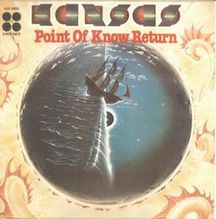
"Point of Know Return" is a song by the progressive rock band Kansas written by Steve Walsh (lyrics), Robby Steinhardt, and Phil Ehart for their 1977 album Point of Know Return.
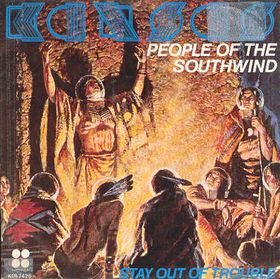
"People of the South Wind" is a progressive rock single recorded by Kansas and written by Kerry Livgren for their 1979 album Monolith.

"This Time I'm in It for Love" is a song recorded by the American rock band Player. It was the second single from their self-titled first studio album. The song was released in early 1978 as the immediate follow-up to their biggest hit and debut single, "Baby Come Back".




















